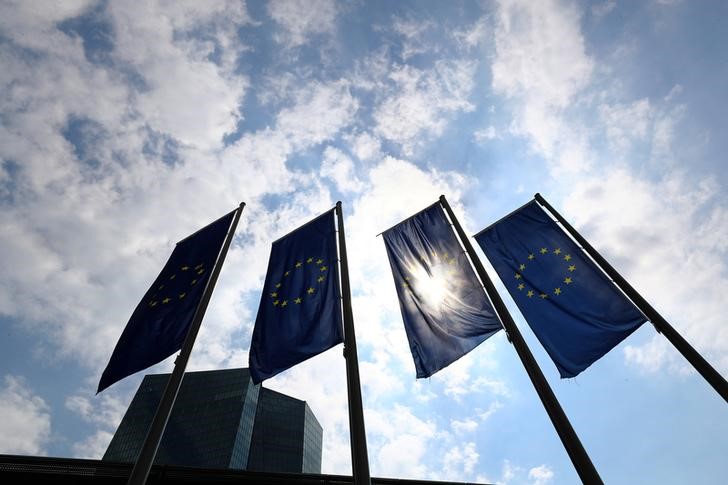By Balazs Koranyi and Francesco Canepa
FRANKFURT (Reuters) - Rapid gains by the euro against the dollar are worrying a growing number of policymakers at the ECB, raising the chance its asset purchases will be phased out only slowly, three sources familiar with discussions told Reuters.
The scheme is due to expire at the end of 2017 but formal talks over its future are only beginning, meaning the European Central Bank is highly unlikely to take any decision at next Thursday's rate meeting, the sources said.
Pressure is building for a gentle rather than a rapid reduction in the pace of asset buying from some policymakers, particularly in the bloc's weaker economies, who are concerned that the strong euro could dampen inflation and hamper growth by making exports dearer, the sources said.
"The exchange rate has become a bigger issue," one of the sources told Reuters. "It is now less favourable for an exit and a stronger argument for a muddle-through option."
The ECB has said it will announce in autumn if it will extend the asset buys, known as quantitative easing (QE) and launched two and a half years ago to bring down borrowing costs, revive growth and prop up inflation.
ECB head Mario Draghi has said that the programme will continue until the central bank is happy that inflation is consistent with its medium-term target of just below 2 percent.
STILL DISJOINTED
As the ECB prepares for what is its biggest policy decision in years, the worries over the euro show just how far it remains from achieving its goal of integrating the currency zone's stubbornly divergent economies.
Germany and Northern Europe are ready to dial back monetary stimulus as their growth rates pick up, just as southern nations take on the added burden of uncompetitive exports on top of high unemployment.
The debate also exposes the dilemma the ECB faces in trying to reconcile robust GDP growth with inflation -- which edged up across the euro zone to 1.5 percent in August -- expected to undershoot its target for years.
"The huge appreciation in the euro is already causing monetary tightening and is equivalent to an increase in interest rates," another source said.
Rate setters were already wary of euro strength in July, minutes of the discussion at that month's policy meeting showed, fretting that an overshoot could undo the very stimulus they hoped to achieve.
But the currency has risen steadily since then and gained 13 percent against the dollar since the start of the year, mostly on growing speculation about an end to the asset purchases. It hit a two-and-a-half-year high of $1.2069 (0.9367 pounds) on Tuesday before edging back below $1.19 on Thursday.
The ECB, which declined to comment for this article, has often said that exchange rates are set by the market and it does not target any particular level.
"You can't have it both ways - a strong economy and at the same time a weak currency... You should also not call it euro 'strength' but rather 'non-weakness'," the third source said.
TAPER VS EXTEND
The sources said no policy proposals had been made and the formal discussion within the ECB's governing council would only begin next week as agreed at the July meeting.
Hawkish policymakers tend to favour a relatively rapid exit from QE, perhaps over six to nine months, with the ECB's guidance alluding to the bank's intent to phase out asset purchases in its policy statement.
Led by Jens Weidmann, the President of the powerful Bundesbank who has already called for a "quick and orderly" exit - they argue that no extension of what is an emergency monetary tool is warranted given rapid growth. [nL8N1L93S8]
In the opposite camp, doves favour an extension of the 60-billion-euro-a-month scheme at a reduced but steady pace and revisiting the issue of exit only next year, once German wage negotiations wrap up.
But any meaningful extension of the 2.3 trillion euro ($2.73 trillion) scheme could run up against asset purchase limits that the ECB has itself imposed.
Without a change to the programme's key parameters, the ECB could buy between 30 to 40 billion euros of bonds in the first half of 2018 but would be severely constrained thereafter, the sources said.
It could further relax a requirement to buy bonds in proportion to each country's ECB shareholding, or include new asset classes such as stocks, as raised in July by one policymaker but not given consideration, or non-performing bank loans.
For legal reasons the ECB is unlikely to remove a cap that limits it to buying only a third of each country's debt, as Draghi himself suggested in July.
To conform with a European Court of Justice ruling on a separate bond purchase scheme, the ECB may in any case favour maintaining either an end date or a commitment to phase out purchases, the sources added.
